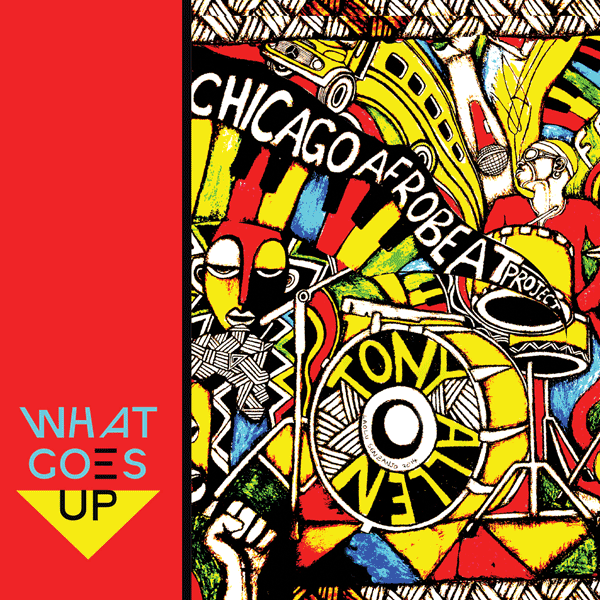(Chicago) Music is the Weapon: Chicago Afrobeat Project Teams up with Fela Drummer Tony Allen and a Constellation of Chicago MCs and Singers on What Goes Up
“We’re not recording two tracks,” announced legendary drummer Tony Allen. He laid down his sticks on his snare drum. The crew of Chicago Afrobeat Project looked at each other across the studio. What had gone wrong?
“We’re recording 10 tracks for an album,” Allen declared.
With that, the Chicago-based collective began putting together their most musically expansive album to date, What Goes Up (release: September 29, 2017). The band flew Allen in from Paris for several sessions, resulting in the first full-album collaboration with Allen in North America.
Along with Afrobeat and jazz icon Allen, the group drew in collaborator vocalists and lyricists from the Chicago scene, inspired by everything from Igbo sayings to gospel: JC Brooks, Kiara Lanier, Legit (Chance the Rapper), Akenya (Noname, Chance the Rapper), Ugochi Nwaogwugwu, Oranmiyan , and Rico Sisney/Maggie Vagle (Sidewalk Chalk).
The heart of What Goes Up beats the pulse and ethos of calling out injustice through music, a spirit refined and harnessed by maverick Nigerian activist and musician Fela Kuti. But the album doesn’t simply stop where the Afrobeat founder left off. “We’re not afraid to try something,” says CAbP keyboard player Kevin Ford. “Some other groups follow Fela strictly, and that’s fine. We stretch that out a little and pull in everything we hear around us,” giving Afrobeat a distinctly Chicago voice.
{full story below}
Fifteen years ago in a West Chicago artist loft, a shifting cast of musicians would come and go each week, all interested in jamming on Afrobeat rhythms. They decided to start a band.
“We wanted to make it a fluid concept,” recalls guitarist David Glines. “There are core members of the band who have been here since the beginning. Some were really familiar with the genre, while others were introduced to it via the band. We had a number of weekly rehearsals and jam sessions. We started with Fela covers then developed our own sound and started touring. A founding concept was that musicians would enter the band, make a mark, and potentially collaborate with us again down the road.”
That same fluid rappaport kicked in when the band began working with Tony Allen. The band brought Allen to Chicago for a series of events, including workshops, as part of the musician’s hope of passing along his knowledge and experience to the next generation. CAbP was the house band. The collaboration grew from there. “It was the chemistry we had,” muses Ford. “You don’t need to talk about it, you start playing and you just click.” It reminded Allen of studio sessions with Fela himself, he said.
“It was cool, man, working with Chicago Afrobeat,” Allen said. “These guys bring themselves to the music, and that’s what makes this album work. That and my beats.”
The chemistry with Allen was only part of the picture. The band has a powerful connection to Chicago’s diverse musical circles, its blues, hip hop, soul, and African emigre sounds. “It was putting on a perfectly fitted glove,” says Glines. “The themes our Chicago guest vocalists bring to this album reflect us as people, as a community.” It’s a feeling captured in the sweet soul of “Beehive,” while other tracks tackle issues close to the Afrobeat spirit, like racial injustice (the searing “Race Hustle” featuring JC Brooks) and environmental justice (“Marker 48” featuring vocalists from Chicago’s innovative Sidewalk Chalk).
Unlike many Afrobeat-inspired projects, CAbP knows exactly when to lay back, when to create some space in the groove for Ford’s delectable key licks, or for bright, tight horns. “I No Know” and “No Bad News” showcase this approach, unspooling with a refreshingly mellow, open sound. “We’ve evolved,” says Glines of “No Bad News.” “You can really feel the soul influence on that track. We didn’t go out of our way to write a mellow track, but that’s what came out. There’s more subtlety to that song, and it plays lyrically into what Kiara and Legit are doing.”
“That subtlety comes from letting the power of the music just happen, not pushing it too hard,” adds Ford. “I feel like a lot of Fela’s songs have that understated power. It’s tricky for a lot of bands to get that to happen. It took us years to learn that.”
Sometimes, though, What Goes Up leaves subtlety behind and just brings the party, the “Afro Party” to be precise, complete with super-funky drums, cascading guitar, and cosmic keys. Even in party mode, the band has learned that less is more, and that change, even as they honor the founding father of their favored style, is good.
“If someone had put this record in front of me 10 years ago, I would have been baffled,” laughs Glines. “We thought we needed extended songs and solos, the way Fela did it. We’ve moved away from that. Now, we see that every second matters. You can’t have something happening unless it’s serving a purpose.” That restraint, mixed with a wildly creative community, makes for great Afrobeat.

